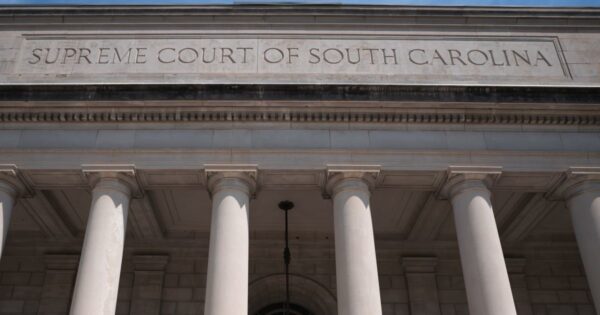ACLU and LWV File Lawsuit Against Partisan Gerrymandering of South Carolina’s Congressional Districts
COLUMBIA, S.C. — The American Civil Liberties Union, ACLU of South Carolina, and Duffy & Young LLC filed a lawsuit today challenging partisan gerrymandering of South Carolina’s congressional districts. The League of Women Voters of South Carolina is the plaintiff.
Every 10 years, South Carolina state lawmakers are tasked with redrawing the lines for congressional districts based on census data. The lawsuit alleges those lawmakers violated the South Carolina Constitution when they manipulated the map to create an artificial Republican advantage in the First Congressional District, a coastal district traditionally anchored in Charleston.
The lawsuit, League of Women Voters of South Carolina v. Thomas Alexander, was filed in South Carolina Supreme Court. It asks the court to exercise original jurisdiction over the case, to recognize a protection against partisan gerrymandering in the South Carolina Constitution, and to invalidate the existing congressional map.
The case follows a ruling earlier this year from the U.S. Supreme Court in Alexander v. South Carolina NAACP. In that case, the ACLU and partners argued the redrawing of Congressional District 1 was a clear example of racial gerrymandering that used race as a proxy for political party. In defending the map, leading South Carolina lawmakers argued that they drew the congressional redistricting plan strictly for partisan gain and that they used party affiliation — not race — to decide which voters to remove from CD1 (see below, under subheading “In their own words”).
Today’s lawsuit takes those lawmakers at their word. Although the U.S. Supreme Court has refused to entertain partisan gerrymandering claims brought under the federal constitution since its 2019 ruling in Rucho v. Common Cause, South Carolina’s Constitution goes further than the U.S. Constitution.
Specifically, it protects against this intentional distortion of democracy by guaranteeing “free and open” elections and an “equal right to elect officers” for all qualified South Carolinians (Article 1, Section 5).
In other states with similar constitutional language — including Kentucky, Pennsylvania, and New Mexico — courts have ruled that partisan gerrymandering violates voters’ right to “free and open” elections. The lawsuit also argues that the congressional redistricting plan violates voters’ rights to equal protection under law, their rights to be free from viewpoint discrimination, and the South Carolina Constitution’s commitment to respecting county boundaries during redistricting.
“Partisan gerrymandering is cheating, plain and simple,” said Allen Chaney, legal director for the ACLU of South Carolina. “South Carolina voters deserve to vote with their neighbors, and to have their votes carry the same weight. This case is about restoring representative democracy in South Carolina, and I’m hopeful that the South Carolina Supreme Court will do just that.”
“South Carolina’s map drawers admit that their congressional plan stacks the deck against more than forty percent of the state’s voters. This is not how democracy works. Courts across the country have struck down partisan gerrymanders, and South Carolina’s Constitution requires its courts do the same. We’re asking the South Carolina Supreme Court to ensure all voters have a fair say in their democracy,” said Theresa J. Lee, senior staff attorney with the ACLU’s Voting Rights Project.
“South Carolina’s Constitution protects its citizens’ right to exercise equal influence over our elections,” said Lynn Teague, VP for Issues and Action of the League of Women Voters of South Carolina. “We are asking the court to establish redistricting standards consistent with our Constitution. Our political process must not become one that only preserves the power of those already in office, but the rights of the people. The League remains committed to ensuring South Carolinians’ voices aren’t drowned out by systems that favor politicians.”
In their own words:
“The panel acknowledged that the General Assembly pursued a political goal of increasing District 1’s Republican vote share. It achieved that goal by moving Republicans into the district and Democrats out of the district.” — John Gore, attorney representing South Carolina lawmakers, in oral arguments before the U.S. Supreme Court in Alexander v. SC NAACP, October 11, 2023 (PDF download)
“After going through a dozen iterations, the truth is when all of Beaufort County is put with a significant portion or all of Charleston County, you get a 50/50 district because there isn’t room for the portions of Dorchester and Berkeley that pull the First red. It is easy enough to do, but we need to settle on what our priorities are.” — Rep. Jay Jordan (R-Florence), at bench trial in Alexander v. SC NAACP, Oct. 3-14, 2022 (PDF download)
"[M]y primary goal was to draw a Republican district while honoring redistricting principles as best as I could." — Sen. Chip Campsen (R-Charleston), bench trial proceedings in Alexander v. SC NAACP, Oct. 3 - 14, 2022
Key quotes from the lawsuit:
“For the first time in a century, Charleston is no longer the anchor of CD1; instead, it is a moat that divides voters in Mount Pleasant and Berkeley County from the rest of CD1 which reaches down the coast to the south.” (Petition for Original Jurisdiction, p. 14)
“South Carolina’s statewide redistricting plan deliberately amplifies the voting power of Republicans and intentionally suppresses the voting power of Democrats. As a result, Republicans get to vote with a megaphone while Democrats must shout from the bottom of a lake.” (p. 32)
“[I]n the case of extreme political gerrymandering, this Court stands as the last bastion against unchecked legislative tyranny.” (p. 44)
The complaint can be found online here.
The petition for original jurisdiction can be found online here.




